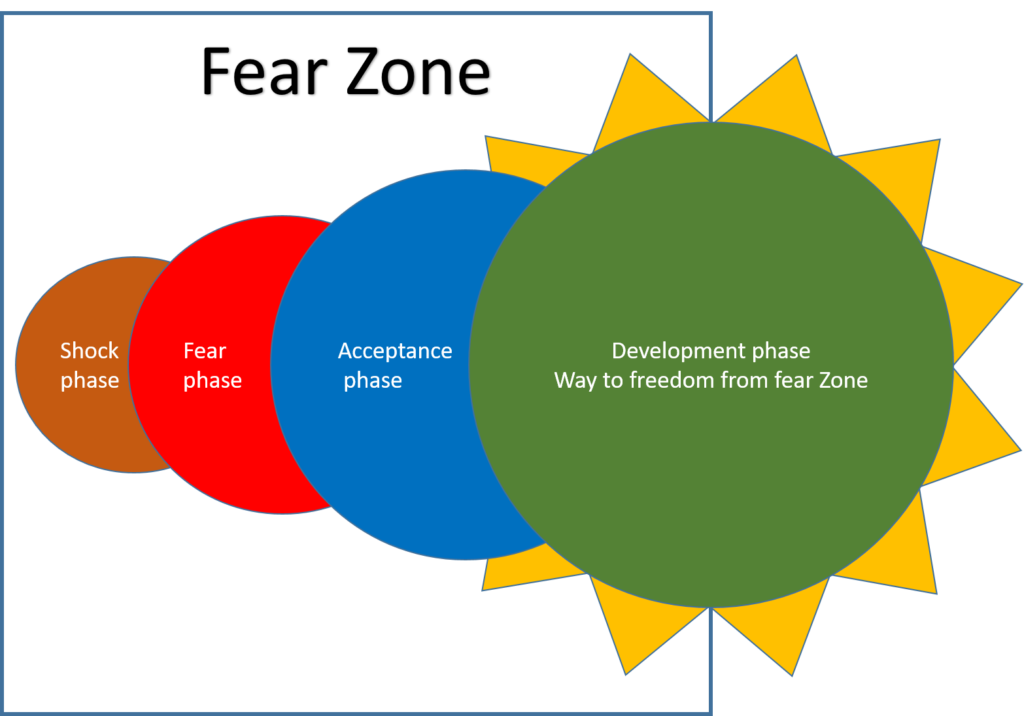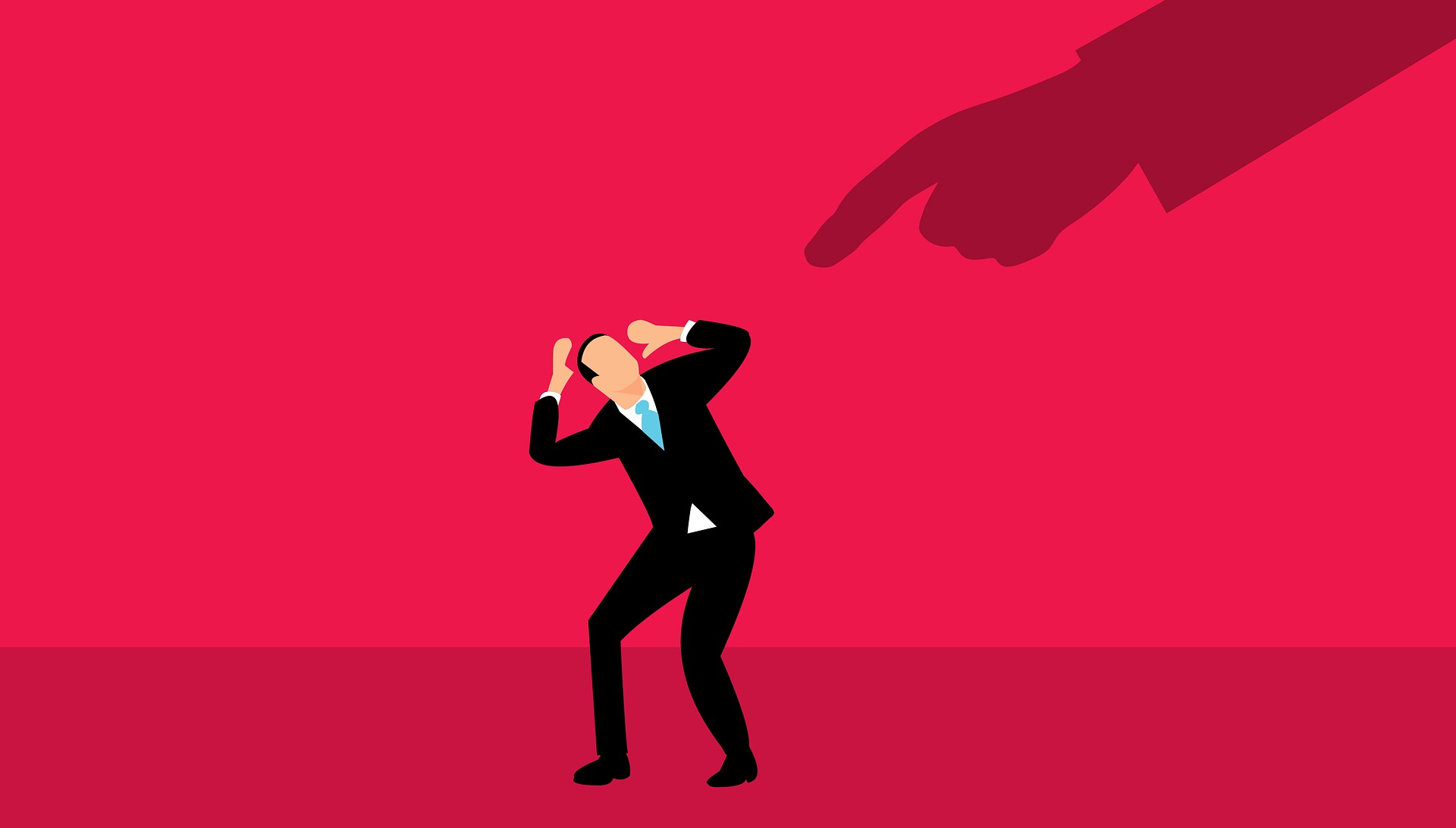I had a call with one of my friends whose COVID-19 report happened to be positive on the day of publishing this article. He told me his story in the office.
As soon as he received his report “positive”, he informed his HR department about it. HR department asked him about employees with whom he had been in physical contact during the last couple of days of his office attendance.
As per the request, he disclosed the list of people he had been in close contact with to the HR department. To be on the safe side HR department asked all those who came in contact with my friend to undergo a COVID-19 medical test.
One of his colleagues called my friend and informed him that as soon as he received this email from the HR department, he felt itchy and irritation inside his throat.
Our brain is very powerful and can create fear instantly if we did not watch our thoughts carefully.
Fear is our biggest enemy
Fear is the biggest enemy for a person, it holds him from achieving success. People experience different kinds of fear. Some are real threats, but the majority are human mind-created fears. It was the fear of failure that made me wait for long to start this blog. I realized that this fear was not real, it was just a state of mind.
People get terrified easily when any uncomfortable situation arises. Political instability, economic downfall, or any pandemic situation, millions of people go through a fear that grabs them and does not allow them to think constructively. The shock period for different people varies, depending upon their mental power to understand and handle the situation.
When the COVID-19 pandemic erupted in late 2019, I started receiving fearful messages very often. This was not because people want other people to be aware of the situation. In many cases, they were doing it out of fear.
When thousands of fearful messages are bombarded from every side, it becomes even more dangerous than the real danger of the circumstances. What to believe, what is authentic, and what is not is kept aside. Some people believe in everything they receive and forward it to others.
Remember, there is a big difference in perception and facts. My perception or observation of a particular situation may not be the same as that of yours. My opinion develops when I receive some information from my reliable sources and you may not accept that as a dependable source.
“Fear creates panic, and panic can make a person do things that are not perceived as normal.”
In the beginning, everyone was shocked to see how quickly coronavirus spread in the world. TV and social media were full of news related to the pandemic. What are the dangers of coming in contact with this virus, and how it can take the lives of millions were being showcased with different statistics. Daily cases were displayed and sent through messages around the world. There was panic everywhere.
You could not skip out of this even if you don’t want to hear about it. Every communication included COVID-19 stories. Some were true stories but the majority of them were based on hearing from unauthentic sources.
Some were referring to its impact and threat to the economy, and others were relating it to the biggest disaster in the job market. Anger and confusion was all around the world.
People who took longer to accept the situation were in real danger of developing emotional and psychological problems.
I personally learned four big phases of handling fear during this difficult time. Those phases are the Shock phase, Fear phase, Acceptance phase, and Development phase.

Shock phase
This is the early stage of the time during fear when a person refuses to accept that some threat is there in the current situation. Sudden shock does not allow a person to accept the condition. The denial of an unpleasant event keeps a person in the shock phase.
If a person does not come out of this phase soon, they may develop deep depression or anxiety symptoms. In the beginning, the person does not accept the tragedy. Some people with a positive attitude and with strong emotions can absorb this quickly, on the other hand, many take a longer period to understand the situation.
The loss that happened is not necessarily physical; it may be a psychological or emotional state. During this phase, a common defense mechanism triggers and helps tranquilize a person to move to the next phase of the situation.
The more time a person takes to get out of this, the more it becomes difficult to handle emotional distress.
One of my relatives gets faint, as soon as she hears any loss of a closed family member, or if any tragedy hits the family. Her panic button is always on to the tragic circumstances. She puts herself in danger whenever there is a shock and does not accept the situation, rather gives up emotionally.
Shock phase can make people go numb, faint, or blame others for their losses.
Fear phase
Fear is the biggest threat to individuals and groups of society that destroys complete confidence if it’s not handled properly. Fear is not new to human life. It is there since our ancestors were fighting with wild animals or extreme weather to survive.
During ancient times, fear of animal attack, a sudden storm, or getting attacked by other groups of people in search of food and other needs was common. Their fear was real for family and society’s survival.
In today’s time, in addition to real fear, there is a big part of psychological or imaginal fear. “What if?”, is the big imaginal fear. What if a pandemic covers the whole world? What if I lose my job during this pandemic? What if there is a financial collapse? What if my health does not support achieving my goals?
Such fears are more related to psychology. People get trapped in “What if”, thinking so badly that they find it difficult to get out of this. Such fears limit a person’s ability to think creatively. The majority of mediocre people suffer longer from this fear phase. They can’t get out of this phase sooner that makes it difficult for them set higher goals and follow them. The more a person stays in this state, the more that fellow develops stress, anxiety, and depression.
Most people start to complain and criticize that the situation is not in their favor. They start blaming their spouse, children, society, the government, or even the situation itself. Instead of blaming factors that are out of their control, if they focus on things that they have control on, they could manage fear in a professional manner. Remember, it is important to get out of this phase as soon as possible. The longer you are in this stage, irritability, anger, panic, and other irrational behavior will develop.
Get out of the “Shock phase” and “Fear phase” phase as soon as possible and move to the next step, which is the “Acceptance phase”
Acceptance phase
This is basically a bargaining phase when a person starts realizing that whatever happened has happened and can’t be undone. Now move on, accept it and search for the solution to get to the normal. This phase brings a person back to their real senses; the healthier and rational way to handle the situation. Without acceptance, a person might not see what actions are required to overcome the circumstances.
Emotions are being identified and healthier choices are made. A person may also choose to isolate himself from others in order to fully cope with the loss. Or sometimes, they get away from fearful news or things that trigger the fear.
In this phase, an individual starts realizing and getting aware of the situation and thinks of ideas on how to handle this circumstance. This stage of the fear zone is the most important in making choices of rational decisions to think positively and move to the next step of development.
Acceptance of any calamity makes a person stronger and gives them the ability to think creatively. Mind comes back to real sense. It allows an individual to see the fact through transparent glasses. It is the best stage to analyze the situation and take the next step appropriately.
Development phase
The way to conquer fear goes through different phases. People with balanced thinking get through each phase soon and learn from every stage of it.
The rational thinking process is one the most important thing develops during this phase of the fear zone. When a person rationalizes the thinking process, it starts with building the ability to deal with challenges. How to handle the situation leads an individual to learn new skills. During this phase of development, his confidence is high.
He learns from the situation and other stages of fear and moves forward. The person starts dealing with challenges.
During this phase, we look for new ways to adapt to the situation or if required, we learn new skills to handle the situation. Our confidence is high because we have achieved our way to freedom. Freedom from fear, from stress, from anxiety, and from all other kinds of psychological and mental blocks that had held us from moving forward.
This final stage of the fear zone develops our positive attitude. We develop hope, we start appreciating the good things happening around us. We respect and value everyone and events around us for helping us overcome the fear.
Get out of the fear zone as soon as possible because your fear is not real, it’s just a mental block. Your achievements are waiting for you when you win over your fears.
Share with others
Please share it with others so they also know “What is a fear zone and how to get out of it?”
Views: 1544



Totally agree!
To overcome or conquer fear and to rise again, one must face it as fear is not the boss.
Thank you Tas for your valuable comments. Please keep visiting this site to see the most recent updates on different topics that may interest you.
well said Zuber sahib, keep going on…
Thank you, Obaid. I am glad that you liked the article. Please keep visiting this site to see the most recent updates on different topics that may interest you.
Well written Zuber bhai, there is a strong need to motivate society with positivity to move towards acceptance and development but it will really take a lot to get out from the fear and shock
Thank you so much Moatasim for sharing your comments. I agree with you. We need to keep motivating each other. Most of us are victims of our own created fears. We need to address and conquer our mental fears and move on. Please keep visiting this site to see the most recent updates on different topics that may interest you.